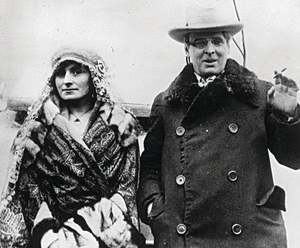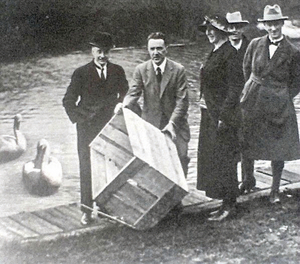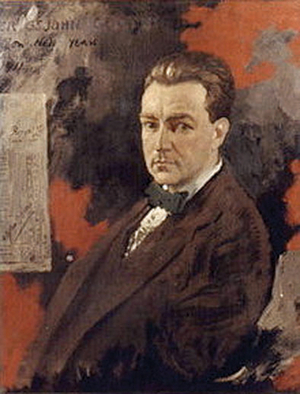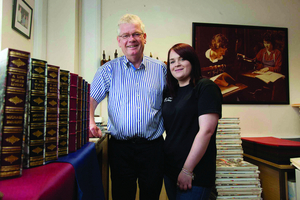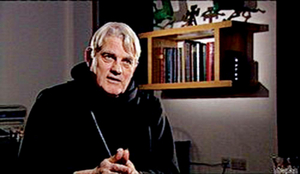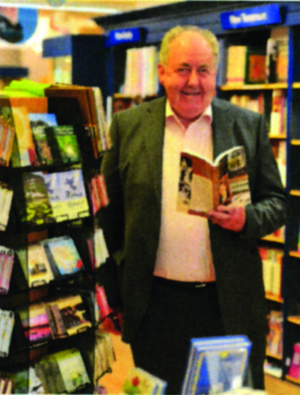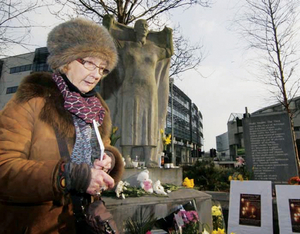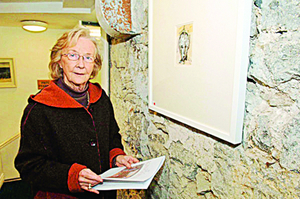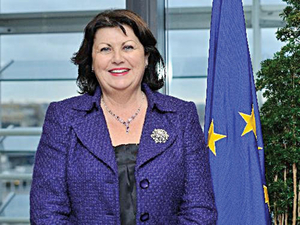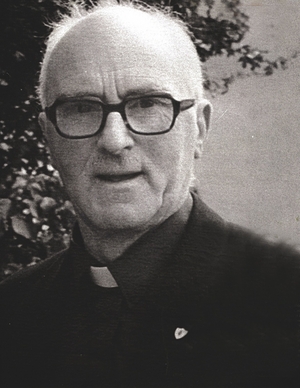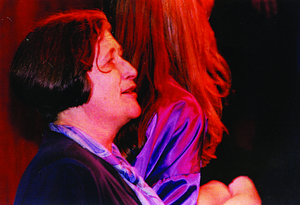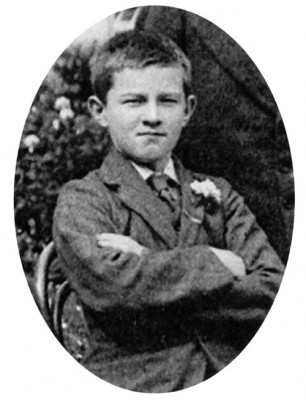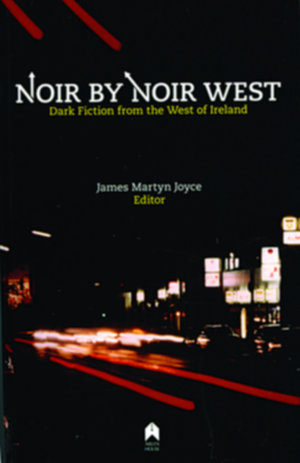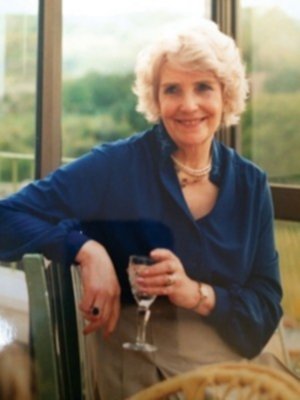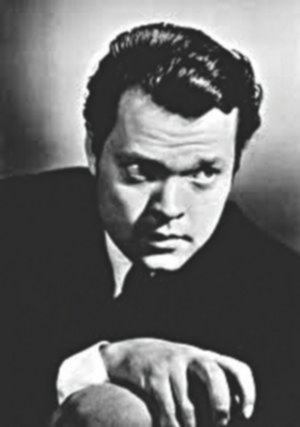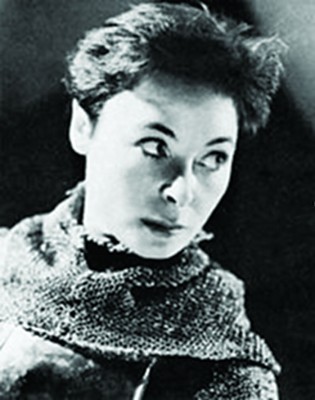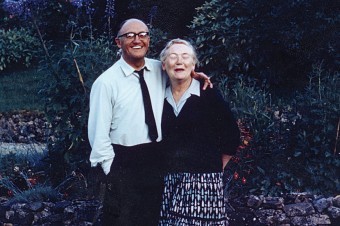The strange exile of a disillusioned ‘Buck Mulligan’
Thu, Aug 21, 2014
Following his narrow escape from Republican forces, who were intent on killing him by the banks of the Liffey that cold night in January 1923, Oliver St John Gogarty wisely took himself off to London. He immediately became the toast of polite society there who delighted in his stories and witty conversation.
Read more ...Colourful Gogarty escapes death by a whisker
Thu, Aug 14, 2014
A precocious and cleverly witty Trinity student in a yellow waistcoat, Oliver St John Gogarty, was to become a close friend of Sinn Féin's founder Arthur Griffith. At its first historic meeting, November 28 1905, Gogarty proclaimed against the 'tyranny of the British government', in the grand manner of a Cicero addressing the Roman senate. But so moving and compelling were his words that when Griffith reported the meeting in his newspaper The United Irishman, Gogarty's speech was the only one he quoted. And he did so at length.
Read more ...The poetic connection between Galway and Gogarty
Thu, Aug 07, 2014
Galway
A grey town in a country bare,
Forty years a-binding, and more to come
Thu, Jul 24, 2014
An extraordinary row on the Late Late Show, 17 years ago, had a positive impact on a small Galway business struggling for survival. ‘A very attractive lady,’ Siubhan Maloney, called into Kenny’s Book Bindery, located in Salthill at the time, and told Gerry Kenny that she was a contestant in the Late Late’s Antique Show. She was re-upholstering an old chair, which included a small shelf. She wanted to see how to re-cover an old book in highly decorated leather, which would sit into the shelf. Jerry was happy to show her how it was done. First of all the pages are handsewn together, then clamped and trimmed ready for gold foil, which is applied with heat. This prevents the pages becoming dusty.
Read more ...The First Holy Communion dress did not fit everyone
Thu, Jul 17, 2014
If there isn’t some dramatic change, and matters as they stand are allowed to drift, it is easy to see that the impact of the child abuse scandals within the Catholic church have had a very negative impact on the present and future generations in Ireland. Despite being one of the most generous generations ever when it comes to helping others, young people today are quite indifferent to the church. In fact many are openly hostile.
Read more ...Coping with the Magdalen fallout
Thu, Jul 10, 2014
Ilearn something of the impact that the Magdalen Laundries scandal had on the Mercy nuns themselves reading the personal testimony of Sister Phyllis Kilcoyne. Sister Kilcoyne is part of the Leadership Team of the Western Province of the Mercy Order.*
Read more ...Patricia’s vocation did not take root
Thu, Jul 03, 2014
Patricia Burke Brogan joined the noviciate of the Mercy Sisters at the convent of St Vincent, Newtownsmith, Galway at the end of the 1950s. It was before the reforms of Vatican II had relaxed rule of the heavy medieval habit, the shorn hair, and a constant reminder ‘to keep custody of the eyes’. What was called ‘discipline’, which was nothing less than outrageous bullying, was meted out on the novices by some of the older nuns, in a cutting and wounding way. The nuns were hard on each other.
Read more ...Was this a glimpse of Dante’s Purgatorio?
Thu, Jun 26, 2014
‘No one wants these women. We protect them from their passions. We give them food, shelter and clothing. We look after their spiritual needs.’ And that was all that was believed to be required for the inmates of the Magdalene Laundry, in Forster Street, Galway. It is true that no one wanted ‘these women’, because of the twisted sense of morality of the time. Girls who gave birth to a child outside marriage were ostracised by society. If the pregnancy and birth could not be kept hidden (some families kept their pregnant daughter locked away in an upstairs bedroom, or sent to a relative in England); people feared local gossip, and judgment to such an extent that parents turned against their own daughters. They brought their daughters to the nuns, and walked away. The problem was out of sight, and, they probably believed, gone away.
Read more ...An artist opened Galway’s ‘Secrets Box’
Thu, Jun 19, 2014
Most families, most adults, and most communities have secrets; past indiscretions they would rather forget about, and usually not very serious. But some of them can be very painful, and are kept hidden, in a sort of a Secrets Box, long after they need to be.
Read more ...Images of Aran more than a century ago
Thu, May 29, 2014
All great books begin with an arresting sentence. I remember as a boy being captivated by JM Synge’s opening sentence in what I consider his greatest work The Aran Islands, first published in 1907, two years before his death. It has not been out of print since:
Read more ...MGQ - many believed she would have been an ideal Taoiseach
Thu, May 22, 2014
I am probably the worst kind of voter that the enthusiastic canvassers could meet. I do not vote for a party, but for a personality, or for a candidate whom I feel will do a good job. I admire politicians. I know that ninety-nine per cent of them are motivated by public service, and genuinely believe that they can effect change. Some of them actually succeed in bringing about change; but it is a long, hard slog.
Read more ...Education is exciting, but probably better to leave the Minister at home
Thu, May 15, 2014
Ms Avril Forrest took her first religion class in the Jes when the school chaplain Fr Derek Cassidy was on sick leave. Famine in Africa, and how the West should respond, was the issue of the day. The class unanimously insisted that the Vatican should sell all its assets, and give the money to relieve world hunger.
Read more ...‘I’ve been waiting five years for this moment’
Thu, May 08, 2014
Seán Duignan, the Irish journalist, newsreader, and political aide and writer, recalls that his time at the Jes, the longest established school in Galway, was generally happy. It was an all-male school then, and had a rowing team that did the school proud.
Read more ...Coláiste Iognáid - ‘Was it Eton or Stowe?’
Thu, May 01, 2014
In any war propaganda is a useful weapon. In World War II both the Allies, and the combined Axis powers used broadcasting, leaflet dropping, false information contained in dead men’s briefcases, diaries, fake military manoeuvres, or through clever counter espionage, to discourage and demoralise the enemy. There were many spectacular successes; but the one that really annoyed the British was the voice of William Joyce, broadcasting almost nightly from Reichssender Hamburg radio. He became known as Lord Haw Haw, a much hated figure.
Read more ...Noir By Noir West - disquieting Galway stories
Thu, Apr 24, 2014
How about this for revenge? A man dumps his wife for a younger model. Wife appears quite civilised about it. But just as ex is about to go off on a classy holiday with new model she asks him to check out an old property she is thinking of buying. It’s in an awful state, but she needs him to trip a switch on the meter box in the tiny space under the stairs so she could check the lights on each floor. It will only take him a minute. Its a small space, and she is wearing a tight skirt and hates spiders.
Read more ...The man who remembered his father
Thu, Apr 17, 2014
During his recent and very meaningful state visit to Britain, and his address to the joint Houses of Parliament, President Michael Daniel Higgins slipped in the fact that his father, John, had fought in Ireland’s struggle for Independence.*
Read more ...A child’s time on Spanish Island
Thu, Apr 10, 2014
I believe that my grandfather, Ronnie Hackett, was surprised when my grandmother agreed to marry him. He was the youngest of six brothers and four sisters, born in the Blackrock area of Cork city. Many of the brothers having a medical qualification went off to see the world with the British merchant navy. But in their later lives all came back to Cork, and enjoyed a happy life fishing and shooting, and a little bit of medicine. Indeed there are several family stories about a brother’s wife apologising to a full waiting room for her husband’s abrupt departure ‘on an urgent medical matter’. Whereas in fact, the call was from another brother to come fishing.
Read more ...The lonely boy who landed on our shore
Thu, Apr 03, 2014
It is possible that when the 16 years-old Orson Welles embarked from the SS Baltic in Galway Bay in August 1931, he visited the Taibhdhearc theatre. In any event, he struck up a friendship with a Galway actor. Two months later he visited the Gate Theatre in Dublin, and went backstage to see his friend. Clearly impressed by what he saw, he left a note for its founding partners, Mícheál MacLiammóir and Hilton Edwards, boldly proclaiming ‘Orson Welles, star of the New York Theatre Guild, would consider appearing in one of your productions, and hopes you will see him for an appointment.’
Read more ...Siobhán McKenna - A legend in Irish theatre
Thu, Mar 27, 2014
French soldiers in World War I carried Joan of Arc’s image into battle at Ardennes, at Charleroi, at the Marne. They wore medals bearing her face around their necks, and tucked her picture into the pockets of their uniforms.
Read more ...An Taibhdhearc - becomes ‘pathway to success’
Thu, Mar 20, 2014
For three years after the opening of the Gate Theatre in Dublin Mícheál MacLiammóir continued to work for An Taibhdhearc. He travelled to Galway as often as three times a week. Despite the Gate's rave reviews for its first play Peer Gynt, for which Mícheál designed its 'symbolic' scenery, money was slow to come in. Mícheál needed the salary that An Taibhdhearc offered. The Minister for Finance, Ernest Blythe (who was soon to take over the running of the Abbey Theatre), and who had taken such interest in the fledgling Galway project, urged its directors to offer MacLiammóir full-time employment. But MacLiammóir felt that his destiny was in Dublin. The Gate opened later in 1928, the same year as An Taibhdhearc, offering Dublin audiences the best of European and American theatre, and rapidly becoming a venue for a new wave of talented Irish writers.
Read more ...